NOUSAKU

- Field:
- Metal Casting & Smithing Specialists
- Location:
- Takaoka-City, Toyama
NOUSAKU
Products
-
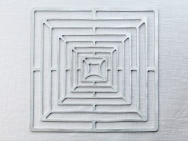 KAGO Square...¥78,600Approx: $535.38 USD
KAGO Square...¥78,600Approx: $535.38 USD -
 KAGO Square...¥22,656Approx: $154.32 USD
KAGO Square...¥22,656Approx: $154.32 USD -
 KAGO Honeyc...¥14,340Approx: $97.68 USD
KAGO Honeyc...¥14,340Approx: $97.68 USD -
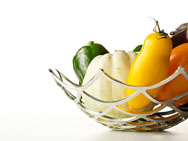 KAGO Dahlia...¥16,608Approx: $113.12 USD
KAGO Dahlia...¥16,608Approx: $113.12 USD -
 KAGO Rose -...¥8,746Approx: $59.57 USD
KAGO Rose -...¥8,746Approx: $59.57 USD -
 KAGO Square...¥9,804Approx: $66.78 USD
KAGO Square...¥9,804Approx: $66.78 USD -
 Lotus¥11,316Approx: $77.08 USD
Lotus¥11,316Approx: $77.08 USD -
 Pure Tin Tu...¥11,619Approx: $79.14 USD
Pure Tin Tu...¥11,619Approx: $79.14 USD -
 Pure Tin Be...¥12,828Approx: $87.38 USD
Pure Tin Be...¥12,828Approx: $87.38 USD -
 Pure Tin Sa...¥52,896Approx: $360.30 USD
Pure Tin Sa...¥52,896Approx: $360.30 USD -
 “Chirori” p...¥18,120Approx: $123.42 USD
“Chirori” p...¥18,120Approx: $123.42 USD -
 “Katakuchi ...¥15,399Approx: $104.89 USD
“Katakuchi ...¥15,399Approx: $104.89 USD -
![Champagne Flute [gold]](/upload/save_image/08261016_521aac779aefc.jpg) Champagne F...¥18,120Approx: $123.42 USD
Champagne F...¥18,120Approx: $123.42 USD -
 Pure Tin Sa...¥10,560Approx: $71.93 USD
Pure Tin Sa...¥10,560Approx: $71.93 USD -
 Pure Tin Sa...¥9,200Approx: $62.67 USD
Pure Tin Sa...¥9,200Approx: $62.67 USD -
 Pure Tin Tu...¥15,818Approx: $107.74 USD
Pure Tin Tu...¥15,818Approx: $107.74 USD -
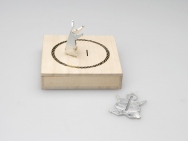 Sumo Wrestl...¥8,746Approx: $59.57 USD
Sumo Wrestl...¥8,746Approx: $59.57 USD -
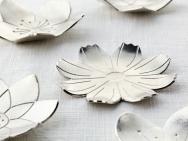 Flower Tray...¥7,839Approx: $53.39 USD
Flower Tray...¥7,839Approx: $53.39 USD -
![[Sheep] “Eto” pure tin sake cup](/upload/save_image/12251710_549bc673ab5d1.jpg) [Sheep] “Et...¥9,351Approx: $63.69 USD
[Sheep] “Et...¥9,351Approx: $63.69 USD -
![[Tiger] “Eto” pure tin sake cup](/upload/save_image/12251834_549bda246a5be.jpg) [Tiger] “Et...¥9,351Approx: $63.69 USD
[Tiger] “Et...¥9,351Approx: $63.69 USD -
![[Rabbit] “Eto” pure tin sake cup](/upload/save_image/12251831_549bd97108b2d.jpg) [Rabbit] “E...¥9,351Approx: $63.69 USD
[Rabbit] “E...¥9,351Approx: $63.69 USD -
![[Dragon] “Eto” pure tin sake cup](/upload/save_image/12251829_549bd8e85ff8e.jpg) [Dragon] “E...¥9,351Approx: $63.69 USD
[Dragon] “E...¥9,351Approx: $63.69 USD -
![[Snake] “Eto” pure tin sake cup](/upload/save_image/12251822_549bd73966d9f.jpg) [Snake] “Et...¥9,351Approx: $63.69 USD
[Snake] “Et...¥9,351Approx: $63.69 USD -
![[Horse] “Eto” pure tin sake cup](/upload/save_image/12251800_549bd216a9155.jpg) [Horse] “Et...¥9,351Approx: $63.69 USD
[Horse] “Et...¥9,351Approx: $63.69 USD -
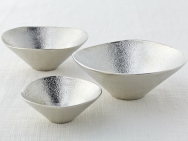 Kuzushi - Y...¥9,048Approx: $61.63 USD
Kuzushi - Y...¥9,048Approx: $61.63 USD -
 Kuzushi - O...¥9,048Approx: $61.63 USD
Kuzushi - O...¥9,048Approx: $61.63 USD -
 Pure tin ro...¥21,144Approx: $144.02 USD
Pure tin ro...¥21,144Approx: $144.02 USD -
 Pure tin re...¥11,619Approx: $79.14 USD
Pure tin re...¥11,619Approx: $79.14 USD -
 Pure tin re...¥11,619Approx: $79.14 USD
Pure tin re...¥11,619Approx: $79.14 USD -
 Sake Cup of...¥10,258Approx: $69.87 USD
Sake Cup of...¥10,258Approx: $69.87 USD -
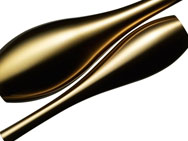 Single-Stem...¥13,584Approx: $92.53 USD
Single-Stem...¥13,584Approx: $92.53 USD -
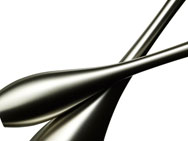 Single-Stem...¥18,120Approx: $123.42 USD
Single-Stem...¥18,120Approx: $123.42 USD -
![Chopstick Rest [8]](/upload/save_image/12141602_4ee84a15696d4.jpg) Chopstick R...¥6,024Approx: $41.03 USD
Chopstick R...¥6,024Approx: $41.03 USD -
 Cutlery Hol...¥16,608Approx: $113.12 USD
Cutlery Hol...¥16,608Approx: $113.12 USD -
 Hedgehog (B...¥17,062Approx: $116.22 USD
Hedgehog (B...¥17,062Approx: $116.22 USD -
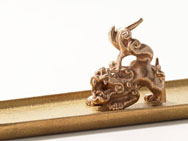 Incense Set¥8,746Approx: $59.57 USD
Incense Set¥8,746Approx: $59.57 USD -
 Wind-Bell (...¥10,258Approx: $69.87 USD
Wind-Bell (...¥10,258Approx: $69.87 USD -
 Wind-Bell (...¥9,653Approx: $65.75 USD
Wind-Bell (...¥9,653Approx: $65.75 USD -
 Wind-Bell (...¥11,619Approx: $79.14 USD
Wind-Bell (...¥11,619Approx: $79.14 USD -
 Wind-Bell (...¥10,577Approx: $72.04 USD
Wind-Bell (...¥10,577Approx: $72.04 USD
KATSUJI NOUSAKU
President

Katsuji Nousaku, a traditional metal casting craftsman, took on the challenge of working with pure tin, a metal that had always been considered too malleable for casting and finishing. Utilizing the "reversal" concept, he took advantage of that very quality and developed a whole new product series of flexible pure tin ware.
NOUSAKU’s uniquely textured metal pieces are now on display at boutiques and major department stores nationwide, including the famous Aoyama and Ginza shopping districts of central Tokyo. Back in Takaoka, his hometown, Nousaku has become something of a local hero for unearthing the global potential of local businesses.
>> Know more about Katsuji Nousaku
NOUSAKU’s uniquely textured metal pieces are now on display at boutiques and major department stores nationwide, including the famous Aoyama and Ginza shopping districts of central Tokyo. Back in Takaoka, his hometown, Nousaku has become something of a local hero for unearthing the global potential of local businesses.
>> Know more about Katsuji Nousaku
Takaoka City
Situated in the northwest of Toyama Prefecture, Japan, Takaoka is the central city of the prefecture’s Western District. Takaoka has the 8th largest surface area of the prefecture and the second largest population after Toyama City. The climate of Takaoka is similar to that of much of the Japan Sea coast. All regions of Toyama Prefecture experience large quantities of winter snow and sultry summer days.
Takaoka officially became a city in 1889, however, its origins date back to 1609 when Maeda Toshinaga of the Kaga Domain entered Takaoka Castle and opened the city, which subsequently flourished as a center of industry. During its first two years, seven metalworkers (imoji) were stationed at what is now Kanaya-machi. This marked the beginning of the long history and fame of Takaoka Copper.
The Great Buddha of Takaoka
At almost 16 meters tall, the Great Buddha of Takaoka is one of Japan's three great Buddhas alongside those in Nara and Kamakura. The current Buddha made of Takaoka bronze was completed in 1933 after the previous wooden Buddha burnt down. It is now situated next to the temple in Takaoka's city center.
Zuiryū-ji Temple
Constructed to mourn the death of Maeda Toshinaga, the daimyo famous for fortifying Takaoka, Zuiryū-ji Zen temple is celebrated as being typical of early Edo period (1603~1867) architecture. Completed in 1663, it is located a few minutes drive from Takaoka station and is a designated National Treasure of Japan.
The Amaharashi Coast
Located north of Takaoka City, Amaharashi is a rocky coastal area of scenic beauty. Dotted with white sand beaches, evergreen pine trees and wonderful views of the 3,000 meter Tateyama Mountain Range, it is noted as one of Japan's 100 most beautiful beach areas.
Kanaya-machi
Boasting an array of traditional buildings, Kanaya-machi is an area of Takaoka with many well-preserved private homes and warehouses from the Meiji period (1868~1912), and is the manufacturing birthplace of Takaoka copperware.
Takaoka officially became a city in 1889, however, its origins date back to 1609 when Maeda Toshinaga of the Kaga Domain entered Takaoka Castle and opened the city, which subsequently flourished as a center of industry. During its first two years, seven metalworkers (imoji) were stationed at what is now Kanaya-machi. This marked the beginning of the long history and fame of Takaoka Copper.
The Great Buddha of Takaoka
At almost 16 meters tall, the Great Buddha of Takaoka is one of Japan's three great Buddhas alongside those in Nara and Kamakura. The current Buddha made of Takaoka bronze was completed in 1933 after the previous wooden Buddha burnt down. It is now situated next to the temple in Takaoka's city center.
Zuiryū-ji Temple
Constructed to mourn the death of Maeda Toshinaga, the daimyo famous for fortifying Takaoka, Zuiryū-ji Zen temple is celebrated as being typical of early Edo period (1603~1867) architecture. Completed in 1663, it is located a few minutes drive from Takaoka station and is a designated National Treasure of Japan.
The Amaharashi Coast
Located north of Takaoka City, Amaharashi is a rocky coastal area of scenic beauty. Dotted with white sand beaches, evergreen pine trees and wonderful views of the 3,000 meter Tateyama Mountain Range, it is noted as one of Japan's 100 most beautiful beach areas.
Kanaya-machi
Boasting an array of traditional buildings, Kanaya-machi is an area of Takaoka with many well-preserved private homes and warehouses from the Meiji period (1868~1912), and is the manufacturing birthplace of Takaoka copperware.

Virtual Shop
Handed down and rooted in Takaoka
NOUSAKU began metal casting in Takaoka City, Toyama Prefecture in 1916. During their early years, they created Buddhist altar fittings, tea ceremony accessories, and flower vases, later adding tableware, home accessories, lampshades, and other decorative items to their lineup. The fine appearance of their wind-bells, tableware, etc. is due to their heritage of advanced casting and refined finishing techniques handed down over a 400-year period. Their local network and flexible staff allows time for continuous research and refinement of their processes, and enables us to respond to various custom requests
With the aid of modern machinery, industrial technology and the cultivated wisdom of past masters, NOUSAKU achieves outstanding harmony in its use of innovative design and top quality materials, and offers excellent value for money.
KAGO - SQUARE - L
Our KAGO (basket) Series are items that capitalize on the flexibility of 100% pure tin. Though common to add other metallic materials to provide durability and facilitate cutting work, NOUSAKU uses tin without such additives. The accumulated experience of skilled craftsmen enables us to produce these unique items.
As pure tin is soft and flexible, the KAGO is easily bent into shape by hand. (Known as ‘Tin Cry’, faint crackling sounds can be heard when bending!) As KAGO can be shaped in many ways, they can be used as fruit bowls or baguette baskets; they can decorate flower vases, become wine bottle holders, among many other ideas.